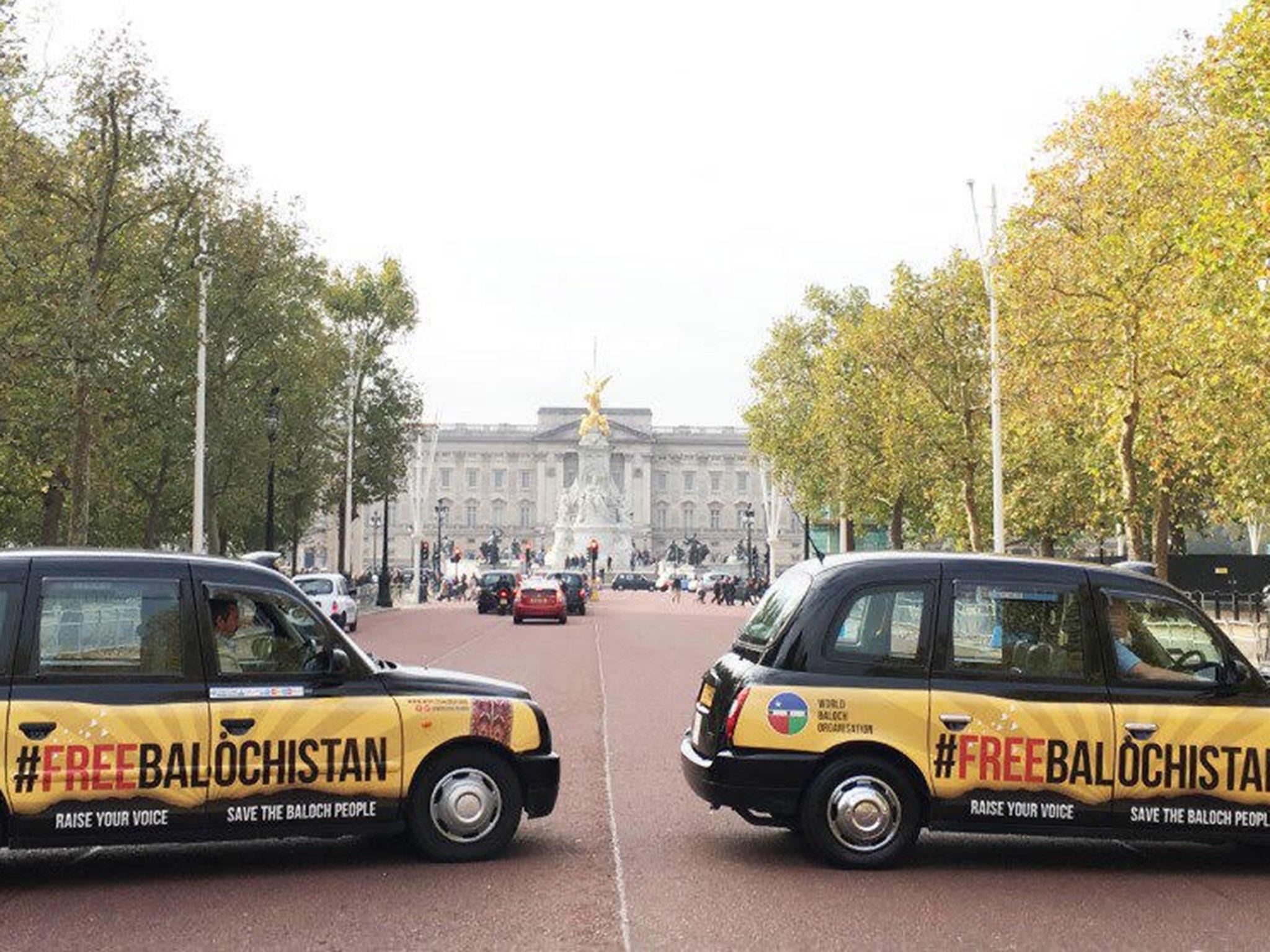TfL removes 'Free Balochistan' adverts from London black cabs after pressure from Pakistani government
The World Baloch Organisation says the Pakistani government has put pressure on the UK Foreign Office and Transport for London to remove the adverts

Transport for London has said "Free Balochistan" adverts put up by a human rights charity must be removed from black cabs in London.
The move follows an attempt by the Pakistani government to have the adverts removed, though TFL told The Independent the advert did "not comply with our advertising guidelines".
The World Baloch Organisation, which advocates for rights of the ethnic Balochs who live in the Balochistan regions straddling Pakistan, Afghanistan and Iran, launched its campaign on London’s black cabs on Monday highlight the “war crimes and human rights abuses” of the Islamabad government.
It said the Pakistani government has put unfair pressure on the Foreign Office and Transport for London, which regulates black cabs, to remove the adverts.
The #FreeBalochistan adverts, which also carry slogans saying “Stop enforced disappearances” and “Save the Baloch people”, were launched as part of a campaign to increase awareness of the conflict in south-west Pakistan which has periodically flared up since Partition in 1947.
But the British High Commissioner in Islamabad was summoned to appear before the Pakistani Foreign Secretary, Tehmina Janjua, on Friday over the adverts which they said “directly attack its territorial integrity and sovereignty”.
A statement by the Pakistani Foreign Office, released to Pakistan Today, said: “The High Commissioner was informed that Pakistan, in line with the UN Charter, rejects actions and advertisements with malicious content that impinge on our sovereignty and territorial integrity.
“Pakistan is aware of the intentions of such sinister and malicious campaigns, which should not be allowed on the soil of a friendly country”.
The latest wave of the insurgency began in 2003 and has increased in ferocity with some armed groups carrying out terror attacks in the region.
The main independence movement has disavowed violence but said Pakistan was using the terrorism to justify oppressing the entire movement.
Bhawal Mengal told The Independent: “The bullying tactics of Pakistan are an attack on freedom of expression. They are an anti-democratic bid to censor the voice of the Baloch people and cover up the war crimes of the Pakistan army in Balochistan.This is a peaceful advertising campaign.
“Pakistan’s aggressive reaction is a bare-faced attempt to intimidate the UK government and Baloch human rights defenders. We do not believe the adverts violate any Transport for London policies. They are not political.
“Our advertising has a human rights theme similar to the adverts of Amnesty International in 2016 in support of the Human Rights Act, which were accepted by Transport for London. We will appeal against the ban.”
Balochs argue that they are ethnically and culturally different from the rest of Pakistan – the majority of whose population is made up of Punjabs and Pashtuns.
A spokesperson of the Pakistan High Commission London said Balochistan was "the largest province of Pakistan with representation in both Houses of the Federal Parliament."
They added that the notion of "Free Balochistan" was "a flagrant attack on the sovereignty and territorial integrity of the country and "any such campaign targeting the sovereignty and territorial integrity of a country is a violation of the universally recognised principles of International Law and the Charter of the United Nations".
However they said the "the notion of the High Commissioner’s putting any pressure on the TfL and FCO to remove the said advertisement is ill-informed and misplaced."
Foreign diplomatic Missions "were in no position to pressurise any department or office of the UK," they said.
The Independent has contacted the Foreign Office for comment.
Subscribe to Independent Premium to bookmark this article
Want to bookmark your favourite articles and stories to read or reference later? Start your Independent Premium subscription today.

Join our commenting forum
Join thought-provoking conversations, follow other Independent readers and see their replies